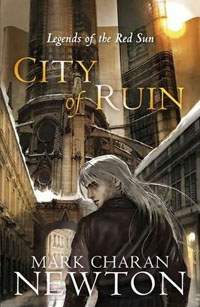By Mark Charan Newton

I started to read an early draft of this that Mr Newton had kindly sent me but decided not to finish it as what I read very obviously wasn't ready to be published. Even so, I had high hopes and huge expectations for it, after all, Nights Of Villjamur ended up in my top 10 books of 2009, but I have to say that City Of Ruin is a long way from reaching the same heights and left me really disappointed.
Now I'm going to preface this by saying that it's not a bad book per se. Newton can still write good, imaginative prose and his deft touch when worldbuilding often brings out little details that sparkle and fascinate. Villiren, while obviously lacking the scale of the capital Villjamur, is no less interesting, it's a violent and oppressive place, richly textured and beautifully realised with small flourishes that serve to make it identifiably different, and the action sequences, when they come, are bloody and violent. But even with all of this in it's favour, nothing can rescue City Of Ruin from an utterly contrived mishmash of a plot that is both dull and trite.
I won't tear the whole thing to pieces in detail, it wouldn't be fair to those who want to read it and besides, I've never written a book because it's bloody hard, if it wasn't everyone would do it, but we left a story of an empress escaping certain death at the hands of a coup and we don't meet her again until page 94 of this book. Even then, we only get sporadic glimpses of her and her companions as, basically, they do nothing much at all - admittedly stuff happens to them but that's the point, they remain passive throughout - until they are rescued from an improbable situation in deus ex-machina style by a mechanical 'God' where they have to sit through page after page of exposition - honestly, I'm sure they would rather have been killed.
The bulk of the story then is taken up by the imminent attack of the Okun but rather than a straightforward war-story we get a giant spider(!) and a brooding vampyre (yes, with a 'y'). Now the giant spider, while faintly ridiculous and smacking a little of Golgotha Falls is part of a sub plot that, if fantastic, is actually believable and thus forgiveable for the most part. The vampyre on the other hand is an off-the-shelf, stock-in-trade, broody vampyre full of existential angst and utterly pointless. While I get the need for Brynd to face up to his sexuality and for someone to force his hand in doing so, an ordinary run-of-the-mill mob boss would have done just as well. Making him a vampyre (and one spelt with a bloody 'y' for crying out loud) served no purpose, it neither revealed character nor moved the story forward, almost as if the author had thought "You know what? Vampires are trendy right now, I'll stick one in here but spell it with a 'y' and then maybe I'll sell a few thousand more books…" I don't seriously believe Newton thinks that way, but you have to wonder.
Additionally the war story takes forever to get going and it lacks critical elements like political wrangling, spies, double agents, technical innovation - all the things that make war preparation interesting, and if you want proof, read his Tor stablemate Adrian Tchaikovsky's Shadows Of The Apt series for how a war should be written. Also there are characters that, by reference, are important within the events of the story but they are only mentioned in passing and we never get to meet them, there is a romance that goes nowhere and adds nothing other than to fill a few pages while we search for a bit more plot and above all there is little or no reference by central characters to events of the previous book, the new emperor, the forthcoming ice-age, the missing empress, the evil cultists…I could go on…so you could be forgiven for wondering if this truly is the middle book of a series or a separate story altogether and with the number of main characters dead by the end of the book I wonder really where it can go.
In the end, while I'm very much going to be in a minority on this one, and I can feel the knives sharpening for me even as I write, In have to say I'm bitterly disappointed with City Of Ruin. It has some good things going for it but a confused and listless plot means it's nowhere near as good as it's predecessor, which is a shame, because on his day, Newton can write as well as anyone. You could possibly put it down to middle book syndrome and it'll all become clear in the end, but for me, this is too much of a mess and I just hope he turns it round for book three.
City Of Ruin is published by Tor through Pan Macmillan and is available from Play.com, Blackwell and all good book stores.